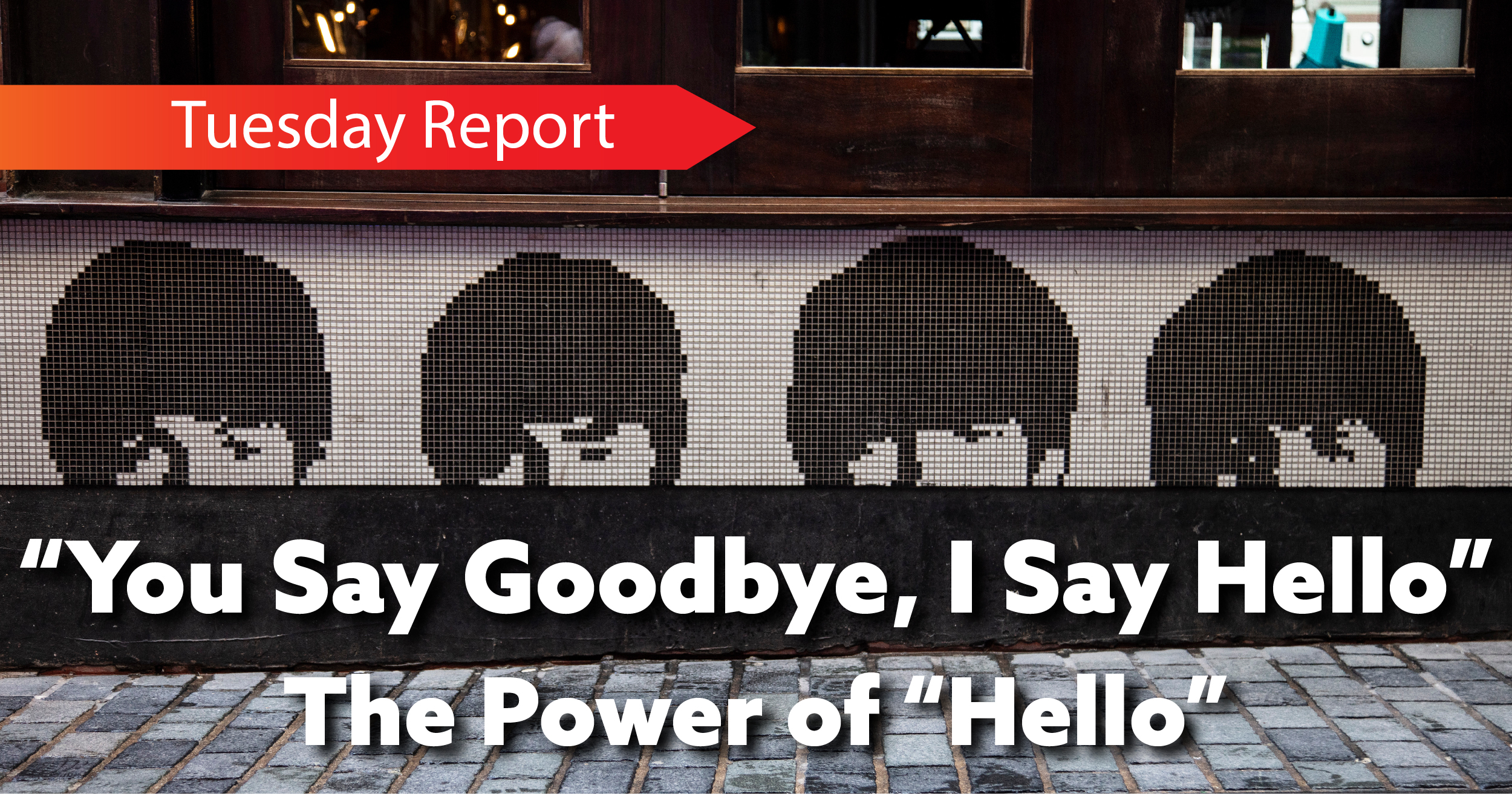The power of “Hello”.
Remember the old Beatle’s Song? “Goodbye, hello.” They recorded it way back in 1967:
You say yes, I say no
You say stop, and I say go, go, go
Oh no, you say goodbye and I say hello.
It doesn’t seem it would be that complicated, but when to say “hello” and “goodbye” is not an easy choice. When you walk into a room for a meeting, some people will smile and approach you with an outreached hand. Others will remain aloof, giving you the clear message you’re not to enter their space. One says “hello.” The other says “goodbye.”
So how friendly or aloof do you want to be? There is no right or wrong answer. It’s a matter of your style, values, and social strategy. What kind of outcome are you looking for? How do you want people to take you?
So what’s your style? Do you speak to strangers when you pass them on the street?
A number of people would say, “Of course. People need the warmth of human interaction even if they’ll never see each other again.”
Another group of people would say, “I never speak to strangers as I walk past them. It’s rude and invades their privacy and mine in a moment we have the opportunity to be alone with our thoughts.”
Whether you speak to a passer-by is often quite determined by custom and culture. In the southwest part of the US where I live, you might get a wave from someone in a pickup as you pass them. In European countries, speaking to strangers on a train is intrusive, rude, and shows you lack manners and culture.
How friendly and approachable we are is about culture, custom, and hierarchy, but what we often don’t point out, it’s about what’s the prevailing emotion in our heads at the time. When we’re feeling aggressive, we outwardly project dominance in our speech and body language, working to become a dominant force in the group. When we’re experiencing fear, our anxiety about rejection if we approach someone causes us to project aloofness and a lack of interest in those who approach us.
The way you react to people is hugely impacted by your personality type. Extroverts have the greatest natural tendency to reach out to people, because that’s how they draw their energy…from other people. Introverts often have great interpersonal relationship skills, but they need a chance to recharge alone and prefer a deeper, more intimate connection. They are much more guarded in protecting their inner space. We find many high performing professionals on the Asperger’s/Autism spectrum. They may project a desire for distance from people and may not appear to want broader and more frequent interactions.
No matter what your inclination is, it is a fact that society rewards people who relate skillfully with others. There is no doubt that aloof, undemonstrative people often do succeed as leaders—but open, transparent, people are more likely to succeed in most organizations in these ways:
- Greater Earning Power. People who have the ability to connect with others earn on average $30,000 more than people with poor people skills. No matter what your technical skills are, people skills tend to keep you off the layoff list and moving up. Friendly people get the promotion and move up.
- Live Healthier Longer Lives. People who connect with others live longer, think clearer, and face a lower risk of heart disease than people who are aloof and uncomfortable connecting. They are more optimistic and suffer less anxiety.
- Friendly People Find Valuable Resources. The network of connections with other people tells us who will help us and where we will find the best resources. Friendliness creates alliances of people who get what is available and what they need.
- Create an Alarm System. There is no doubt that we live in dangerous times in organizations. We always have layoffs looming. AI is attaching spy systems, sometimes called “bossware,” to employees’ software. One piece of information can save a job or career. We need people whom we are connected to and who are connected to the organization who spot the dangers and opportunities coming.
- Escape the “Cell Phone Stone Age.” Building a career, family, or organization demands that we are connected to each other. The cell phone can connect us to any person on the planet, but it also leads us into what I call the “cell phone stone age,” in which we live in our own isolated world with our heads buried in cell phone trivia. We need to get out of an artificial world and into contact with those around us.
Bottom line is really that whether “hello” comes naturally to you or is a struggle, we need to invest some thoughtful effort to do it well. If you are the person who “never met a stranger,” ask yourself if you are coming over as genuine or phony, authentic or false. Better still, ask others how they experience you, and make some thoughtful changes to align with friendly authenticity. And if the “hello” greeting tends to stick in your throat, challenge yourself to get out of that comfort zone for the betterment of the world around you and your own best interests.
Frequently I find people choosing the few people they believe are important to them—and they often choose wrong. Every person deserves the respect of our attention. We live on this planet to build together. Every person knows something and somebody we ought to know. Connecting with people is a really effective way to live. Hello is a very powerful word.






